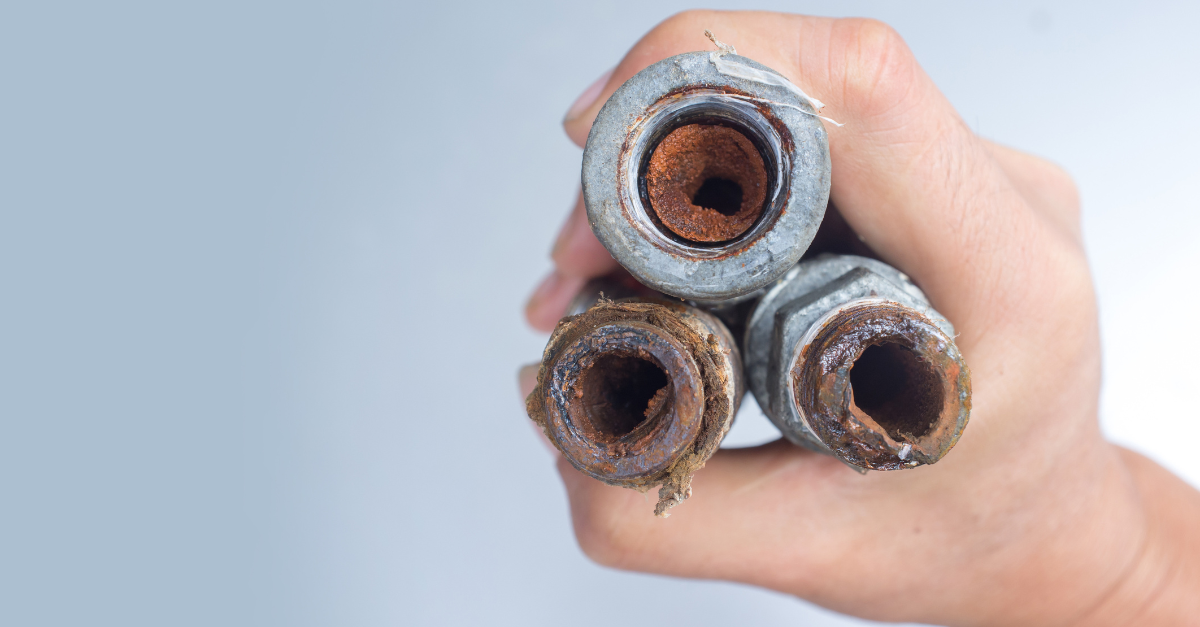Piping system for supply and potable water technology
The aquatherm green polypropylene product family is a pioneering solution for drinking water and supply pipes, as well as for maritime applications....

Whether in industrial plants, office complexes, hotels or hospitals - water pipes are used everywhere for drinking water supply, for heating, for cooling and for industrial processes. But many pipe installations are threatened by an often undiscovered danger: deposits inside the pipes, so-called incrustations. They can lead to complete blockages of pipes and lead to expensive consequential damage - even bursting the pipe. And the more advanced an incrustation is, the more difficult it is to remove. The damage is unstoppable and inevitable. It is therefore important that you regularly check your pipe system and, if necessary, have it replaced before it is too late. In this blog post, we explain why plastic pipes are the better choice.
Incrustation refers to deposits that form inside water pipes. Metallic pipe systems are particularly affected because their surface properties make them more susceptible to deposits. These can remain undetected for a long time and then lead to pipe rupture or leaks due to the increasing pressure in the pipe system. In the worst case, this damage can lead to complete production failures in industrial plants and bring operations to a standstill in hotels, hospitals or other large buildings.
The formation of incrustations is complex and depends on various factors. The most common cause of deposits in water pipes are minerals such as magnesium and calcium contained in the water. The hardness of the water depends on the region and varies depending on the presence of limestone, dolomite or gypsum rock. As long as the deposit remains thin, like a layer of lime on the pipe wall, there is no danger. However, if the incrustation in the pipe increases unnoticed for a long time, this can lead to expensive consequential damage.
If you notice a steady drop in pressure on your systems or consumers, incrustation can be the cause.
If you see limescale deposits at the tapping points, this is also an indication that your pipes may also be calcified.
Due to their smooth surface and chemical resistance, plastic pipes are less susceptible to deposits or incrustations than metal pipes. The smooth surface minimises the adhesion of particles and thus prevents deposits in the pipes. In addition, plastics do not become encrusted because they are not electrically conductive and the ions or particles dissolved in the water do not accumulate on the pipe wall.
Another advantage of plastic pipes is their resistance to corrosion. In metallic systems, corrosion damage can occur in connection with deposits. Plastic pipes are also more resistant to chemical substances that can be used, for example, for hygienic pipe cleaning without attacking the pipe wall.
In addition to the incrustation problem, there are other advantages of plastic pipes over metal pipes. For example, plastic tubing is more durable than metal tubing and is lighter and easier to install. Overall, plastic pipes are a good choice to avoid incrustations in water pipes due to their smooth surface properties and their chemically stable resistance. Due to their longer service life and lower maintenance costs, plastic pipes are a sensible long-term investment in your installation.
In an industrial company, the machines were automatically switched off because the cooling water pressure fell below the tolerance value. As a result, the pump pressure was increased, which would mean higher energy costs, but the machines could continue to operate.
However, the actual cause of the pressure drop was reduced water flow due to deposits inside the pipes. Due to the increase in pressure, parts of it came loose and clogged the valves and screens of the system. The result: the entire system was blocked.
How could the damage have been avoided? With a preventive look through an inspection camera inside the pipes. And then by replacing them early on with incrustation-free PP plastic pipes.
Why does your investment in plastic pipes pays off? There are several reasons for this. Incrustations in water pipes can cause significant problems. With plastic pipes made of polypropylene like those from aquatherm, you can avoid deposits and expensive follow-up costs right from the start. Due to their smooth surface and chemical resistance, our PP pipe systems remain almost completely free of incrustations over their entire service life with normal water quality. It is therefore worth investing in plastic pipes to save costs and avoid problems in the long term.
Get to know practical examples of incrustation-free installations here:
The aquatherm green polypropylene product family is a pioneering solution for drinking water and supply pipes, as well as for maritime applications....
Due to its technical and ecological properties, polypropylene is a popular material for piping systems. Polypropylene pipes also impress with their...
How can the modern shipbuilding industry meet the increasing challenges of weight, corrosion, and environmental sustainability? Why are more and more...